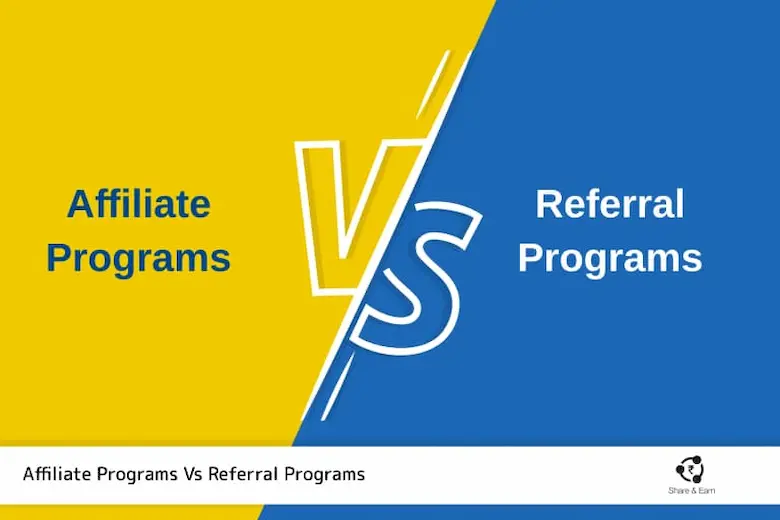Word-of-mouth and business growth are closely related. When satisfied customers share their positive experiences, it significantly influences purchasing decisions and leads to increased brand loyalty. Since businesses are always looking for ways to expand their customer base and improve their sales, they tend to rely on word-of-mouth promotions. Two popular methods are used to help them: affiliate programs vs referral programs.
While both programs reward people or businesses for promoting a company’s products or services, there are distinct differences between the two. Let’s take a look at the significant differences and similarities between them
What Are Affiliate Programs?

An affiliate program is a performance-based marketing strategy where you collaborate with external partners, known as affiliates, to promote your products or services. These affiliates can be individuals or other businesses with relevant audiences.
Who Are Affiliates?
Affiliates can be anyone with an online presence and a relevant audience. Popular choices include bloggers, social media influencers, YouTubers, and even other businesses in complementary industries.
How Does It Work?
- Program Setup: You establish the program guidelines, commission rates, tracking methods, and payment terms.
- Affiliate Recruitment: You actively recruit potential affiliates who align with your brand and target audience.
- Promotion: Affiliates promote your products or services through their chosen channels using unique tracking links or codes.
- Tracking & Attribution: You track sales or conversions generated by affiliate links and codes to attribute commissions accurately.
- Payment: You pay affiliates their earned commissions based on the agreed-upon terms.
Affiliate Program Example
You are the owner of an online store that sells athletic wear.
You partner with a fitness blogger who has a large following on Instagram. The blogger promotes your clothing line in their posts, directing followers to your website using a unique affiliate link. Every time someone clicks the link and makes a purchase, the blogger earns a commission on the sale.
What Are The Benefits & Drawbacks?
Affiliate programs are popular because they provide a way to expand your marketing efforts and generate additional revenue. But they also come with a few drawbacks.
Let’s take a closer look at the benefits and drawbacks associated with affiliate programs.
| Benefits | Drawbacks |
| Reach a wider audience with affiliates’ established audience and expand your brand reach. | Recruiting quality affiliates with engaged audiences takes time and effort. |
| It is a cost-effective marketing strategy because you only pay for results. | You have to make sure affiliates are promoting your brand ethically and accurately. |
| Affiliates improve brand awareness by creating additional intersections for your brand. | There’s a risk of fraudulent clicks or conversions, requiring robust tracking mechanisms. |
| Backlinks from affiliate websites can benefit your website’s search engine ranking. | Compared to referral programs, conversions from affiliate traffic might be lower. |
Also Read: Earn the Most with the Best Fashion Affiliate Programs
What Are Referral Programs?

A referral program rewards your existing customer base to recommend your products or services to their friends, family, and network. Rewards for referrals can be discounts, store credit, free products, or other benefits.
Who Are The Referrers?
Your existing satisfied customers are the primary referrers in a referral program.
How Does It Work?
- Program Design: You develop a program structure with clear incentives for both the referrer and the referred customer.
- Referral Tools: You provide easy-to-use referral tools like unique referral links or codes for your customers to share.
- Promotion: You can encourage customer participation through program communication and promotional efforts.
- Tracking & Attribution: Track referrals and conversions to ensure accurate reward distribution.
Reward Fulfillment: Deliver promised rewards to both the referrer and the referred customer upon successful completion of the referral action (e.g., purchase).
Referral Program Example
You have a food delivery service.
In your referral program, your existing customers can earn a discount on their next order for every friend they refer. All they need to do is make sure their friend signs up and places their first order. This motivates your satisfied customers to become brand advocates, which in turn expands your customer base with people likely to enjoy your service.
Also Read: How to Create a Successful Referral System
What Are The Benefits & Drawbacks?

Referral programs are the product of a popular marketing strategy in which businesses rely on existing customers to promote products or services to their network of friends, family, peers and acquaintances. In turn, these existing customers benefit from the rewards that the business provides.
Let’s explore the benefits and drawbacks of referral programs:
| Benefits | Drawbacks |
| Rewarding referrals strengthens customer relationships and builds brand loyalty. | Referral programs primarily rely on your existing customer base, limiting initial reach. |
| Referrals from trusted sources often convert at higher rates than other marketing channels. | Growth in a referral program can be challenging as it depends on organic customer participation. |
| Satisfied customers become brand advocates & promote your products organically. | High referral rewards can reduce your profit margins if not carefully managed. |
| Referral programs can provide some light into your customer base and their networks. | Tracking complex referral structures (e.g., multi-tier programs) can be challenging. |
Let’s Make A Decision
When it comes to choosing between affiliate programs Vs referral programs it should be noted that both can be effective in building customer acquisition and increasing sales.
Let’s take a closer look at each option to help you make an informed decision.
| Feature | Affiliate Programs | Referral Programs |
| Who can participate? | Anyone who meets the program’s criteria | Existing customers |
| Target audience | Affiliates’ audience (may or may not be familiar with the brand) | Referred individual (likely has some brand awareness through the referrer) |
| Relationship with brand | No prior experience required | Existing customer relationship |
| Promotion methods | Diverse channels like blogs, social media, website reviews | Direct sharing through email, text messages, or social media posts |
| Rewards | Commissions based on sales, leads, or clicks | Discounts, store credit, free products, or services |
| Focus | New customer acquisition | Customer loyalty and advocacy |
While affiliate and referral programs have distinct advantages, they’re not mutually exclusive. Consider a hybrid approach that uses the strengths of both. This can be particularly effective for businesses with established customer bases while also seeking wider audience reach.
Know the core differences between affiliate programs vs referral programs (or even a combination) to grow your marketing efforts and achieve unimaginable success. Keep affiliating and referring!
Frequently Asked Questions
A. Referral programs reward existing customers for recommending products to friends and family, while affiliate programs partner with external influencers to reach a broader audience.
A. Affiliate programs focus on marketing a company’s products through referrals, while partner programs encompass a wider range of collaborations, including co-branding and distribution.
A. Affiliates are outside promoters who recommend products to a broad audience, while referrals are existing customers who recommend products to their friends and family.
A. Yes! This can be a powerful strategy to target new audiences while engaging existing customers.
A. Choose affiliate programs for wider audience reach and brand awareness. Referral programs are ideal for strengthening customer loyalty and driving repeat business.
Q. How can I measure the ROI of my program?
A. You can measure the ROI of your program by tracking customer acquisition costs, conversion rates, and revenue generated through the program.



